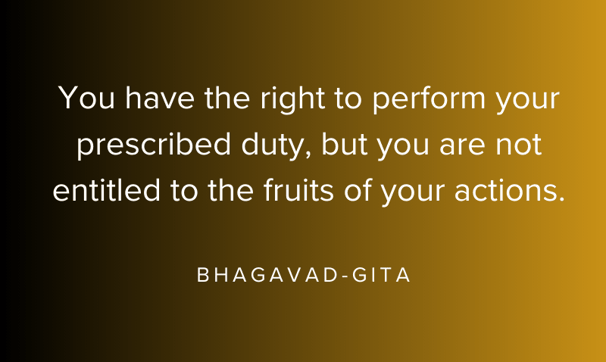"You have the right to perform your prescribed duty, but you are not entitled to the fruits of your actions." - Bhagavad-Gita
SUCCESS


"You have the right to perform your prescribed duty, but you are not entitled to the fruits of your actions."
Bhagavad-Gita
"You Have the Right to Act, but Not the Right to the Results" - Insights from the Bhagavad-Gita
Introduction:
The Bhagavad-Gita, a revered Hindu scripture, provides profound insights into various aspects of life, including the concept of detached action and the notion of detachment from the outcomes of our endeavors. One significant quote that encapsulates this idea is, "You have the right to perform your prescribed duty, but you are not entitled to the fruits of your actions." This powerful statement encourages individuals to focus on the process of action rather than fixating on the desired outcomes. Let's explore the deeper meaning behind this quote and how it can guide us in leading a more fulfilling and balanced life.
Understanding the Quote:
The quote emphasizes the importance of performing one's duties and responsibilities diligently and with sincerity. It acknowledges that individuals have the right and obligation to engage in their prescribed roles and actions. However, it also emphasizes the need to detach oneself from the attachment to the outcomes or rewards that may result from those actions.
The phrase "you are not entitled to the fruits of your actions" highlights the idea of relinquishing expectations and desires for specific outcomes. It implies that individuals should focus on performing their duties selflessly and with a sense of duty, rather than being solely motivated by the potential rewards or gains that may follow. Detaching oneself from the fruits of action fosters a sense of inner peace and freedom from the anxiety or disappointment that may arise from being overly attached to outcomes.
Application in Life:
The quote from the Bhagavad-Gita holds valuable insights for our own lives. Here are a few ways in which we can apply its wisdom:
Embrace duty and responsibility: Identify and fulfill your prescribed duties and responsibilities in various aspects of life, such as work, relationships, and personal growth. Act with sincerity, integrity, and dedication.
Focus on the present moment: Instead of fixating on the future outcomes, immerse yourself fully in the present moment and give your best effort to the task at hand. Cultivate a mindset of mindfulness and engage in the process with complete attention and awareness.
Let go of attachment to outcomes: Recognize that the results of your actions are influenced by various factors beyond your control. Practice detaching yourself from expectations, desires, and the need for specific outcomes. Shift your focus from the destination to the journey itself.
Find fulfillment in the process: Cultivate a sense of joy and fulfillment in the act of performing your duties and actions. Take satisfaction in the effort you put forth and the positive impact you can make through your work, rather than relying solely on external validation or rewards.
Practice selflessness: Shift your perspective from self-centeredness to a mindset of service. Serve others and contribute to the greater good without seeking personal gain. Perform your actions with a sense of duty and a desire to make a positive difference in the world.
Conclusion:
The quote "You have the right to perform your prescribed duty, but you are not entitled to the fruits of your actions" from the Bhagavad-Gita invites us to adopt a mindset of detached action and selfless service. It reminds us to focus on the process of performing our duties with sincerity and dedication, while relinquishing attachment to specific outcomes. By embracing this perspective, we can find greater inner peace, fulfillment, and a sense of purpose in our actions, while freeing ourselves from the burden of expectations and desires.


